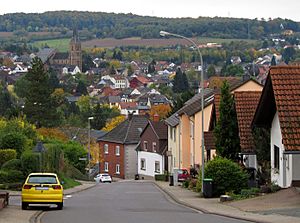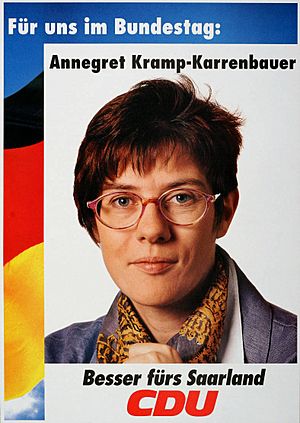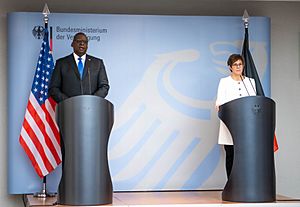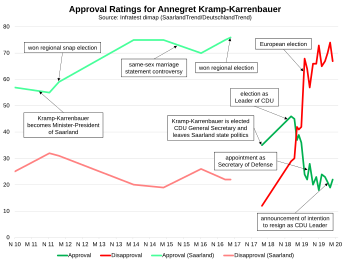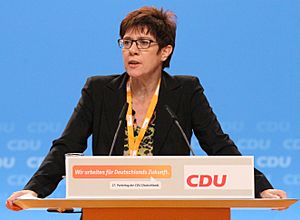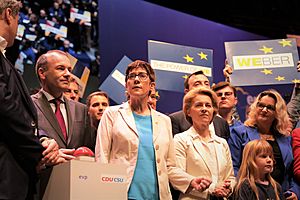Annegret Kramp-Karrenbauer facts for kids
Quick facts for kids
Annegret Kramp-Karrenbauer
|
|||||||||||||||||||||||||||||||||
|---|---|---|---|---|---|---|---|---|---|---|---|---|---|---|---|---|---|---|---|---|---|---|---|---|---|---|---|---|---|---|---|---|---|
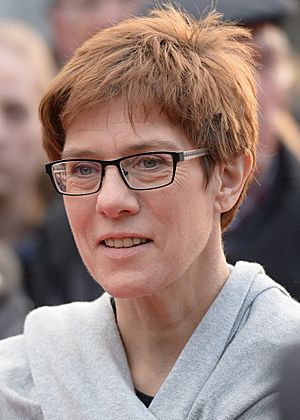
Kramp-Karrenbauer in 2016
|
|||||||||||||||||||||||||||||||||
| Leader of the Christian Democratic Union | |||||||||||||||||||||||||||||||||
| In office 7 December 2018 – 22 January 2021 |
|||||||||||||||||||||||||||||||||
| General Secretary | Paul Ziemiak | ||||||||||||||||||||||||||||||||
| Deputy | Volker Bouffier Julia Klöckner Armin Laschet Ursula von der Leyen Thomas Strobl Silvia Breher |
||||||||||||||||||||||||||||||||
| Preceded by | Angela Merkel | ||||||||||||||||||||||||||||||||
| Succeeded by | Armin Laschet | ||||||||||||||||||||||||||||||||
| General Secretary of the Christian Democratic Union |
|||||||||||||||||||||||||||||||||
| In office 26 February 2018 – 7 December 2018 |
|||||||||||||||||||||||||||||||||
| Leader | Angela Merkel | ||||||||||||||||||||||||||||||||
| Preceded by | Peter Tauber | ||||||||||||||||||||||||||||||||
| Succeeded by | Paul Ziemiak | ||||||||||||||||||||||||||||||||
| Minister of Defence | |||||||||||||||||||||||||||||||||
| In office 17 July 2019 – 8 December 2021 |
|||||||||||||||||||||||||||||||||
| Chancellor | Angela Merkel | ||||||||||||||||||||||||||||||||
| Preceded by | Ursula von der Leyen | ||||||||||||||||||||||||||||||||
| Succeeded by | Christine Lambrecht | ||||||||||||||||||||||||||||||||
| Minister-President of the Saarland | |||||||||||||||||||||||||||||||||
| In office 10 August 2011 – 28 February 2018 |
|||||||||||||||||||||||||||||||||
| Deputy | Christoph Hartmann Peter Jacoby (interim) Heiko Maas Anke Rehlinger |
||||||||||||||||||||||||||||||||
| Preceded by | Peter Müller | ||||||||||||||||||||||||||||||||
| Succeeded by | Tobias Hans | ||||||||||||||||||||||||||||||||
| Leader of the Christian Democratic Union in the Saarland |
|||||||||||||||||||||||||||||||||
| In office 28 May 2011 – 19 October 2018 |
|||||||||||||||||||||||||||||||||
| General Secretary | Roland Theis | ||||||||||||||||||||||||||||||||
| Deputy | Peter Altmaier Peter Jacoby Klaus Meiser Daniela Schlegel-Friedrich Stephan Toscani |
||||||||||||||||||||||||||||||||
| Preceded by | Peter Müller | ||||||||||||||||||||||||||||||||
| Succeeded by | Tobias Hans | ||||||||||||||||||||||||||||||||
|
|||||||||||||||||||||||||||||||||
| Personal details | |||||||||||||||||||||||||||||||||
| Born |
Annegret Kramp
9 August 1962 Völklingen, Saarland, West Germany |
||||||||||||||||||||||||||||||||
| Political party | Christian Democratic Union | ||||||||||||||||||||||||||||||||
| Spouses |
Helmut Karrenbauer
(m. 1984) |
||||||||||||||||||||||||||||||||
| Children | 3 | ||||||||||||||||||||||||||||||||
| Alma mater | Saarland University University of Trier |
||||||||||||||||||||||||||||||||
Annegret Kramp-Karrenbauer (born 9 August 1962), often called AKK, is a German politician who has now retired. She served as the Minister of Defence for Germany from 2019 to 2021. Before that, she was the leader of a major political party, the Christian Democratic Union (CDU), from 2018 to 2021.
In February 2020, Kramp-Karrenbauer announced she would step down as CDU leader. She also decided not to run for chancellor in the 2021 national election. Armin Laschet took over as CDU leader in January 2021.
Before leading the CDU, Kramp-Karrenbauer was the party's secretary general. She also served as the Minister-President of Saarland from 2011 to 2018. She was the first woman to lead the government of Saarland. She is known for her balanced political views. Kramp-Karrenbauer is a practicing Catholic. She was the second woman to become Germany's defence minister. Christine Lambrecht succeeded her in this role.
She left her position in the Bundestag (Germany's parliament) and retired from politics after the 2021 national election.
Contents
Early Life and Education
Annegret Kramp was born on August 9, 1962, in Völklingen, a town in Saarland, West Germany. She grew up in the nearby town of Püttlingen. Her father was a teacher and a headmaster.
She finished high school in 1982. She thought about becoming a teacher but decided to study politics and law instead. She attended the University of Trier and Saarland University. She earned her master's degree in 1990.
Political Journey
Annegret Kramp-Karrenbauer joined the CDU political party in 1981 while still in high school. In 1984, she was elected to the local council in Püttlingen. The next year, she became the head of the CDU group in her city.
From 1991 to 1998, she worked as a policy officer for the CDU in Saarland. In 1998, she became a member of the federal Bundestag for seven months. In 1999, she advised Peter Müller, who was a leader in the Saarland parliament. That same year, she became the head of the Women's Union, a part of the CDU.
State Minister (1999–2011)
Kramp-Karrenbauer was elected to the Landtag of Saarland (Saarland's state parliament) in 1999. She became the Minister of the Interior in Saarland, the first woman in Germany to hold this position. She took on more responsibilities over the years.
In 2004, she changed roles and became Minister of Education in 2007. In 2009, she became Minister of Labor. During her time in state government, she also served as minister for women, sports, family, and culture at different times.
Minister-President of Saarland (2011–2018)
In 2011, Kramp-Karrenbauer was elected Minister-President of the Saarland. She took over from Peter Müller. She later ended the existing government coalition and called for new elections. She believed the coalition had lost trust and stability.
Kramp-Karrenbauer and the CDU won the state election in 2012. This was seen as an important test for Chancellor Angela Merkel's policies during the European debt crisis. Under Kramp-Karrenbauer's leadership, the CDU gained more votes in the 2017 state elections.
While Minister-President, Kramp-Karrenbauer, who speaks French, also worked to improve relations between France and Germany. She was the Commissioner for Cultural Affairs under a special treaty between the two countries. She also promoted the French language in Saarland. Her goal was to make Saarland a bilingual region, speaking both German and French.
Secretary General of the CDU (2018)
In February 2018, Chancellor Merkel chose Kramp-Karrenbauer to be the new secretary general of the CDU. She was confirmed with a very high percentage of votes. As secretary general, she managed the party and its election campaigns. She also traveled around the country to listen to people's concerns and work on new ideas for the party.
CDU Leadership Election (2018)
In October 2018, after some difficult election results, Chancellor Merkel announced she would not seek re-election as CDU party leader. This led to a leadership election. Friedrich Merz and Jens Spahn also ran for the position.
Kramp-Karrenbauer was seen as a possible successor to Merkel. She was known for her balanced political views. Polls showed that CDU voters and the public generally favored her. On December 7, she won the election, becoming the new leader of the CDU.
Leader of the CDU (2018–2020)
After her election, surveys showed a temporary increase in support for the CDU. However, Kramp-Karrenbauer faced some challenges. Before the 2019 European Parliament election, a video by a YouTube personality named Rezo criticized the ruling parties. Kramp-Karrenbauer suggested that election laws might need to change to prevent social media figures from influencing voters during campaigns. This statement was criticized as an attack on free speech and affected her popularity among young people.
The European Elections resulted in the CDU's lowest national vote share ever. Rumors began that some CDU politicians wanted a different candidate for chancellor. Kramp-Karrenbauer announced her resignation as CDU leader on February 10, 2020. This decision followed a political crisis in the state of Thuringia. Her successor was elected later that year.
Minister of Defence (2019–2021)
When Ursula von der Leyen became President of the European Commission in July 2019, Kramp-Karrenbauer took over her role as Federal Minister of Defence. This was her first position in the federal government.
For the 2021 national elections, Kramp-Karrenbauer was chosen to lead the CDU campaign in Saarland. After being elected, she decided to step down from parliament to allow another candidate, Markus Uhl, to take her seat.
International Issues
In November 2020, Kramp-Karrenbauer commented on the conflict in Nagorno-Karabakh. She described it as "the first real drone war in human history."
In April 2021, she accused Russia of taking aggressive actions by building up troops near Crimea and its western border. She rejected Russia's claim that this was a response to a large NATO military exercise.
In mid-2021, Kramp-Karrenbauer oversaw the German military's withdrawal from Afghanistan after nearly two decades. In July 2021, she sent a German warship, the frigate Bayern, on a seven-month journey to Asia. This was the first German warship to pass through the South China Sea since 2002.
Armed Forces
During her time as Defence Minister, Kramp-Karrenbauer apologized to soldiers who had faced unfair treatment for many years. In 2021, she helped pass a law to support these soldiers.
In 2020, Kramp-Karrenbauer disbanded a company of the Special Forces Command (KSK). This happened after serious rule-breaking was discovered. She later pushed for reforms within the unit instead of disbanding it entirely.
In June 2021, Kramp-Karrenbauer recalled 30 German soldiers from service in Lithuania. This was due to reports of serious misconduct.
Also in 2021, Kramp-Karrenbauer opened Germany's first Air and Space Operations Centre (ASOC) in Uedem. This expanded Germany's space monitoring capabilities.
Public Opinion
While she was Minister-President of Saarland, Kramp-Karrenbauer was very popular. Her approval ratings were consistently high, often in the 70s. She was considered the most popular politician in Saarland for many years.
When she entered federal politics, her popularity was also positive for a while. It peaked in January 2019, making her the second-most popular politician overall. However, her popularity declined after some public mistakes and election losses for the CDU. By February 2020, she was among the less popular German politicians.
Political Views
Kramp-Karrenbauer is seen as a moderate politician within the CDU. She is considered to have traditional social views but more left-leaning economic policies. Some describe her as more conservative than Angela Merkel. However, she was often nicknamed "Mini-Merkel" because of her similar political style.
Kramp-Karrenbauer has expressed concerns about same sex marriage. However, she supported a proposal for a mandatory gender quota for company boards in 2012. This was an initiative that Chancellor Merkel's party generally opposed.
During the 2013 federal election campaign, Kramp-Karrenbauer suggested that Germany's top income tax rate should be higher. She believed that previous reductions had gone too far.
In 2015, she caused a public discussion by saying that if the definition of marriage was broadened, it could lead to other demands, such as marriage between close relatives or more than two people.
For the 2021 national elections, Kramp-Karrenbauer supported Armin Laschet as the CDU's candidate for chancellor.
Foreign Policy Views
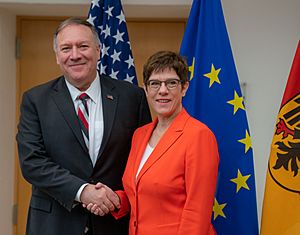
Kramp-Karrenbauer has criticized the Nord Stream 2 gas pipeline, which would increase gas imports from Russia to Germany. She stated that it was not just an economic project but a political one.
She has supported selling weapons to Saudi Arabia. She argued that Germany's ban on arms exports to Saudi Arabia made it less credible in European security policy.
In late 2020, Kramp-Karrenbauer suggested that the European Union should try again to reach a trade agreement with the United States after the 2020 elections.
In October 2021, Kramp-Karrenbauer discussed the possibility of using nuclear weapons as a deterrent against Russia.
Immigration and Refugees
Kramp-Karrenbauer supports stricter immigration policies. She supported Angela Merkel's decision to allow migrants into Germany in 2015–2016, but also called for tougher rules in some cases. In early 2016, she opposed closing Germany's borders, fearing it could harm the European Union.
In December 2017, she said that the age of unaccompanied young refugees should always be checked. She noted that some refugees might give false ages to be treated as children. She also said that people who hide their identity or destroy their papers should face serious consequences. She suggested checking mobile phones to help confirm a person's identity. She also proposed using special aircraft for deportations instead of commercial planes. In November 2018, she demanded that offenders who are expelled should be banned from re-entering Germany and the entire Schengen area for life, citing a serious incident in Freiburg as an example.
Other Activities
Kramp-Karrenbauer has been involved in many organizations:
- German Council on Foreign Relations (DGAP), Member of the Advisory Council (since 2023)
- Center for European Policy Analysis (CEPA), Co-Chair of the International Leadership Council (since 2022)
- GLOBSEC, Member of the International Advisory Council
- Munich Security Conference, Member of the Advisory Council (since 2019)
- German Adult Education Association (DVV), president (since 2015)
- Central Committee of German Catholics (ZdK), member
- European Foundation for the Speyer Cathedral, Member of the Board of Trustees
- Konrad Adenauer Foundation (KAS), member
- Max Planck Society, member of the Senate
- Max Planck Institute for Informatics, member of the Board of Trustees
- Talat Alaiyan Foundation, patron
Personal Life
Annegret Kramp-Karrenbauer is a Roman Catholic. She is married to Helmut Karrenbauer, who is a retired mining engineer. They have three children, born in 1988, 1991, and 1998. They live in Püttlingen. Kramp-Karrenbauer enjoys reading and speaks French.
See also
 In Spanish: Annegret Kramp-Karrenbauer para niños
In Spanish: Annegret Kramp-Karrenbauer para niños
 | Mary Eliza Mahoney |
 | Susie King Taylor |
 | Ida Gray |
 | Eliza Ann Grier |


